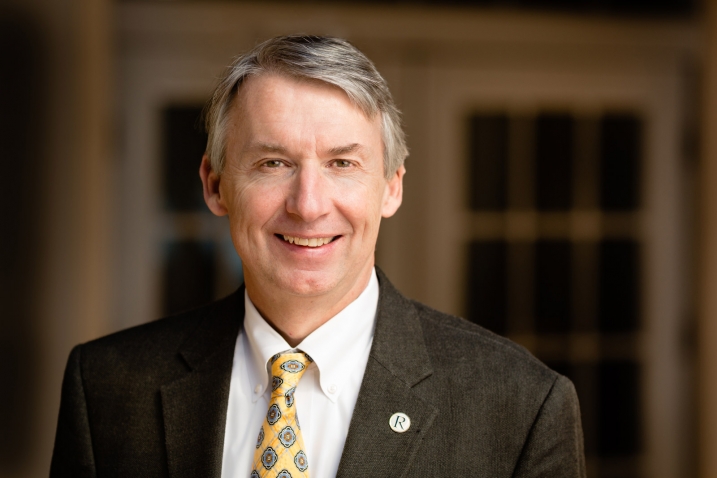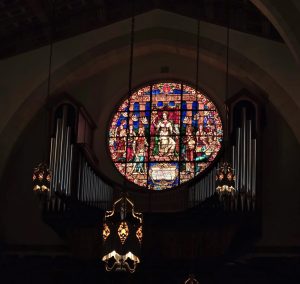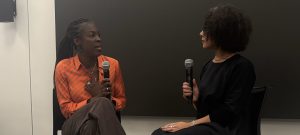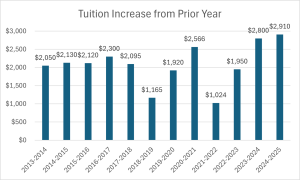
(Photo by Scott Cook)
Editor’s note: For more information and coverage on the issue President Grant Cornwell is addressing, please see the bottom of this article.
Thank you for your patience and participation as we have endeavored to navigate the tricky issues surrounding the recognition of evangelical Christian student organizations and our nondiscrimination policy.
The questions at stake on all sides are questions of social justice. That is everything and the only thing we are talking about here, as questions of freedom of identity and questions of religious belief and practice are all social justice questions. As such, matters of this gravity, this centrality to our mission, require serious, probing, open-minded deliberation.
Further, the issues and questions on all sides are ones of diversity and inclusion. Some have also approached this issue as though upholding diversity and inclusion as a core value of our college only points in one direction. I will tell you that I don’t see it that way.
When I talk about religious inclusion—being open to students, faculty, and staff of all faith traditions— it is not just as a matter of fairness but of the integrity of our mission.
When I look at the state of our nation, I see less and less willingness and ability to listen across difference. I see increasing stridency and polarization. And I see intolerance of points of view that differ from one’s own.
These are profoundly undemocratic tendencies being fueled by media and modeled by our highest public offices. Surely it is the ideal of a college that we are grounds where all views can be heard, entertained, and critically and respectfully and rigorously engaged.
To linger on this point just a bit more, it is not simply that we should seek to permit and make space for ideological difference; we need to invite it as the condition of our very enterprise. To the extent that this community of learners is composed of people who think alike is the extent to which we jeopardize our own academic integrity.
So, yes, I very much want conservative voices and views in the mix with liberal ones. I hope we have conservatives and liberals, libertarians and socialists in dialogue, making their case for what they see as true and just.
And when it comes to religious difference, I hope we all, but especially our students, can study with, talk with, and listen to peers who see the world as a Buddhist, a Hindu, a Muslim, a secular humanist, and Christians in all their variety.
And I especially hope we all develop the capacity to listen to views different from our own with a balance of intellectual empathy and critical acumen. This balance is very important. Understanding is advanced in dialogues that are grounded in a disposition of human compassion – reaching across divides in a sincere effort to understand how the world looks and feels to another. But that is just the first step.
Serious inquiry doesn’t rest with an easy relativism, where we simply note, or even tolerate, difference. Instead, critical inquiry begins there and then moves to an examination of the evidence and grounds of beliefs and values, to an analysis of history and power and privilege. That is what we say we do here. I believe it is a sound mission. And the nation needs our graduates who have this experience and facility.
This endeavor, which essentially is the project of liberal inquiry, cannot happen unless we have a campus climate where all views are respectfully engaged, where everyone is at the table, and where everyone’s views are accountable to standards of rigor, analysis, and open, respectful criticism.

This is what democratic deliberation feels like. It takes time. It is messy. It involves the testing of ideas by throwing them open for criticism. Most importantly, it takes listening…critical, careful, respectful listening. This is an element of democratic deliberation that is essential and much more useful in the discernment of justice than strident argument or fist pounding.
If you look beyond our campus, if you look to Washington, you see what the opposite looks like. I wanted to believe—I do believe—that we could be better than that, that we could model how to sort through a very complex and difficult set of issues using all of the tools of democratic deliberation.
We have had conversations, letter-writing campaigns, petitions, motions on the floor of SGA and the CLA faculty, news reporting, editorials, research, open forums, surveys, committee reports, and a demonstration.
To all of this I say, bravo! We have, for the most part, gone about this process demonstrating mutual respect and earnest exchange.
I now believe it is time for us to bring this matter to closure. I will offer only three indications of our direction.
First, we will continue to affirm our current nondiscrimination policy unchanged. It reads: “Rollins College does not discriminate on the basis of sex, disability, race, age, religion, color, national or ethnic origin, ancestry, marital status, veteran status, sexual orientation, gender identity, gender expression, genetic information, physical characteristics, or any other category protected by federal, state, or local law, in its educational programs and activities.”
Our campus community has embraced and affirmed this policy, and in the present case, I want to be responsive to that. So, the first point of direction is that the nondiscrimination policy will remain in place unchanged.
Second, what some colleges and universities have done to address the matter at hand in a way that enables the recognition of certain evangelical Christian groups is to create a rider to the nondiscrimination policy. It is called a ministerial exemption or religious carve out. After much discussion, listening, research, and reflection, I have come to the view that this approach is flawed and that will not be our direction.
Let me say a word about this. The general idea of this approach is that faith-based organizations ought to be able to organize themselves in accord with their tenets of faith, specifically when it comes to the discernment of who may hold positions of leadership. These carve outs or riders read something like this: “Faith-based organizations may apply the tenets of their faith in the selection of student leaders.”
There is some surface attraction and logic to this, some common sense. If you are a faith-based organization, one would expect you to want your leaders to share and manifest the tenets of faith that define the purpose around which you gather.
However, I reject this approach for three reasons: (i) first, again, my sense is that the will of this community rejects it, and it is important for me to be responsive to that; (ii) second, there is no getting around the matter of its giving license to potential discrimination in principle; a rider like this stipulates that doctrines of faith, even if discriminatory, are to be accommodated; and, finally, (iii) I can find no compelling reason why faith as a dimension of identity should necessarily trump in moral importance other dimensions of identity like race, gender, or sexual orientation.
Third, our resolution to this matter will be to introduce a new stipulation regarding the selection of leaders for all recognized campus organizations. It is this: All and only current students who are active members of a student organization will be entitled to stand for office for all leadership positions in those organizations and—importantly—processes and procedures by which leaders are selected will be transparent, in compliance with the non-discrimination policy, and embody democratic values.
It will take a little time to work on implementing this across all student organizations. The thrust of these stipulations is to entrust and empower students to use open and transparent procedures to select their own leaders.
I am hopeful that the evangelical Christian organizations in question will accept these as our terms required for formal recognition. If they do, they are welcome to apply for recognition, and they will be welcome to be active, engaged, and accountable participants in our collective quest for understanding.
In conclusion, let me just say thank you. Thank you for your serious and earnest engagement with this issue. Thank you for sharing your own ideas and listening to the ideas of others. And thank you for exercising patience as we sorted through the issues together.
Rollins will be a better place because of this dialog and this resolution of this matter.
Read more on the issue:
Non-discrimination policy will remain unchanged, no exemption to Cru
Cru decision imminent: Here’s what you need to know
















Be First to Comment